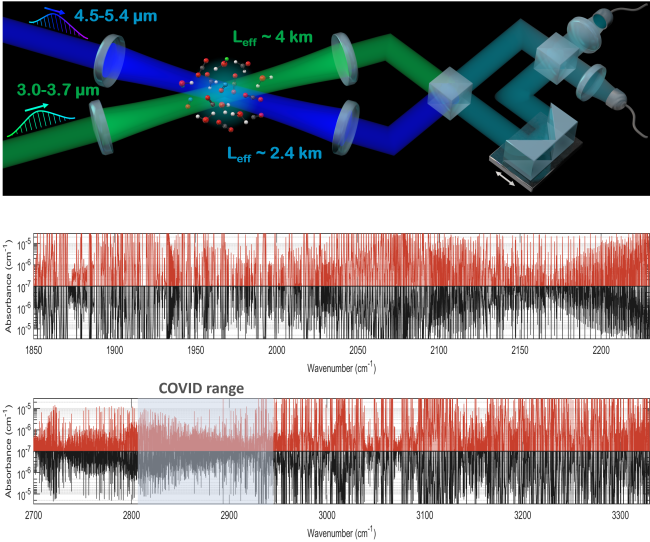Modulated ringdown comb interferometry for sensing of highly complex gases
| Author | |
|---|---|
| Abstract |
Gas samples relevant to health and environment typically contain a plethora of molecular species that span a huge concentration dynamic range. High-concentration molecules impose a strong absorption background that hinders robust identification of low-concentration species. While mid-infrared frequency comb spectroscopy with high-finesse cavity enhancement has realized many of the most sensitive multi-species trace gas detection to date, its robust performance requires gas samples to contain only weak absorption features to avoid dispersing cavity resonances from the comb line frequencies. |
| Year of Publication |
2025
|
| Date Published |
2025-02
|
| Journal Title |
Nature
|
| Volume |
638
|
| Start Page or Article ID |
941–948
|
|
MRCI_Nature 2025.pdf23.77 MB
|
|
| DOI | |
| URL | |
| Download citation | |
| JILA PI | |
| Related Publications | |
| Related JILA Highlights | |
| Associated Institutes | |
Journal Article
|
|
| JILA Topics | |
| Publication Status | |
| Publication Image |

|


 The Physics Frontiers Centers (PFC) program supports university-based centers and institutes where the collective efforts of a larger group of individuals can enable transformational advances in the most promising research areas. The program is designed to foster major breakthroughs at the intellectual frontiers of physics by providing needed resources such as combinations of talents, skills, disciplines, and/or specialized infrastructure, not usually available to individual investigators or small groups, in an environment in which the collective efforts of the larger group can be shown to be seminal to promoting significant progress in the science and the education of students. PFCs also include creative, substantive activities aimed at enhancing education, broadening participation of traditionally underrepresented groups, and outreach to the scientific community and general public.
The Physics Frontiers Centers (PFC) program supports university-based centers and institutes where the collective efforts of a larger group of individuals can enable transformational advances in the most promising research areas. The program is designed to foster major breakthroughs at the intellectual frontiers of physics by providing needed resources such as combinations of talents, skills, disciplines, and/or specialized infrastructure, not usually available to individual investigators or small groups, in an environment in which the collective efforts of the larger group can be shown to be seminal to promoting significant progress in the science and the education of students. PFCs also include creative, substantive activities aimed at enhancing education, broadening participation of traditionally underrepresented groups, and outreach to the scientific community and general public.